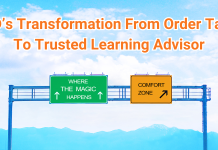
Imagine you had a roadmap to meaningful work.
We’re all chasing that one true goal: finding work that feels good. At times, it can seem as though the dream of waking up every day and loving your job has been placed in the rear view mirror. But is there a way to finally get what we want? Can we truly love what we do?
Sarah Vermunt is a speaker, founder of Careergasm.com, and the author of Careergasm: Find Your Way to Feel Good Work. I recently interviewed Sarah on the LEADx podcast about her approach to finding meaningful work, and how we can navigate our way back in love with our 9-5. (The interview below has been lightly edited for space and clarity)
Kevin Kruse: You say that one of the hardest things to do for career happiness isn't picking what you want to do, but admitting it to yourself. What do you mean by that?
Sarah Vermunt: I'm a career coach. A lot of people come to me with one of two problems. Many of them will say, “You know, I have this job I hate, but I don't know what I want” or “I have this business that I built that I hate, and I don't want to do it anymore, but I don't know what I want to do instead.” Very quick in our work together, we find out very often that that's actually not the problem. The problem is that on some level they do know what they want, but they're afraid to want it because there's a big difference between―like you say, not knowing what you want and not admitting that you want it―and sometimes admitting that you want something is even worse than feeling lost because it actually puts the pressure on you to do something about it.
Kruse: Tell our listeners about ‘the resistance.’
Vermunt: Resistance comes in a couple of forms, at least for me and the people I work with. It seems to come in two main forms.
The first is when you're resisting something because you're actually telling yourself that you should do it and you have to do it and you don't really want to do it. It's just avoiding something that feels bad. Then there's another form of resistance, and this is where people really dig in their heels where people are trying to or want to pursue something, but it just feels so scary that they will distract themselves by any means necessary to prevent themselves from doing it because the action piece of it just feels too hard.
One of the things I talk about in the book is my own resistance when I've been doing things that are scary but exciting. For example, developing a course for people. One day, I remember I did 12-20 crazy things to procrastinate working on this project that I really wanted to do, and I was doing all of those crazy things, like watching 12 TED Talks, and making a batch of brownies, and eating a whole bunch of guacamole, and playing with the cat and farting around on Instagram, and all of that was because this thing that I really wanted to do felt really scary. I think that's when resistance comes in for a lot of people. The thing you want just feels too scary.
Kruse: How do people get hung up about the money piece when it comes to switching careers?
Vermunt: You can't be a career coach without talking about money because the money piece is usually what keeps people stuck in jobs that they hate because everybody has these ‘bag lady’ fears. The chapter that's called The Cheese Maker and the iPhone is actually a story about a woman I worked with. She was really successful in her career. She was working in finance. She said to me, “Well, I can't leave finance to become an artisan, like a cheese maker or something.” She was interested in art, working as an artisan or a healer of some kind. We hadn't nailed it down yet. She's like, “Well, I can't do that. I like my iPhone. Like, I need to keep my iPhone.” I had to say to her, “Do you really think that cheese makers don't have iPhones?” It was just a really interesting turning point for her because she thought, “Oh, my God. Like, I have these crazy, like, blown-up stories in my head about poverty and fulfilling work.”
Many people tie the ideas of poverty and fulfilling work together and tie the ideas of abundance and lots of financial security with work they hate. Those things aren't mutually exclusive and tied together.
Kruse: We often blow up these fears in our minds, and they feel really real to us at the time.
Vermunt: We all have funny fears. It's so interesting how we place them in ‘I either have money’ or ‘I'm living on the streets.’ There's no in-between. That's when you know some of the crazy fear stuff is creeping up on you, when you can't even be rational about it.
Kruse: I like to challenge our listeners to get 1% better every day. Is there something you want to challenge them to do today for their career?
Vermunt: I totally do. I've been thinking about this actually. I would love to challenge your listeners to drop one thing that feels bad so that they can lean a little further in the direction of something that feels good because very often you might not know what your dream job is or the exact way you want to run your business, but we have this internal compass that says, “Oh, this feels warm or this feels cold.”
If you can just turn away from something that feels not quite right and turn more towards something that is already feeling good for you, I think it'll be wonderful for your career and your business.
—
Kevin Kruse is a New York Times bestselling author, host of the popular LEADx Leadership Podcast, and the CEO/Founder of LEADx.org, which provides free world-class leadership training, professional development and career advice for anyone, anywhere.





